Arizona and Nevada make up 3% of the U.S. population — and are vital to picking a president
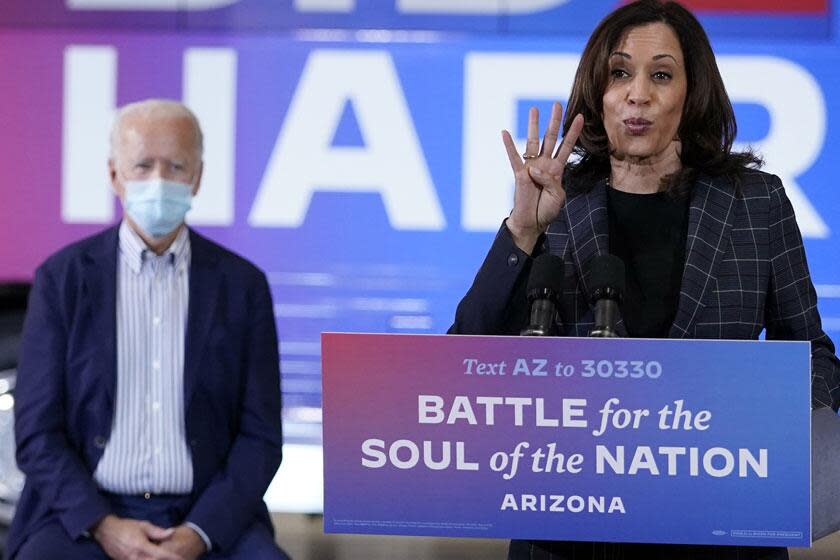
When President Biden flies into Nevada on Monday and to Arizona the following day, he’s likely to compliment the West’s natural beauty, pay homage to the unmatched political power of the Culinary Workers Union and nod to local Democratic elected officials.
Another truth about his visit to the two Southwestern states may remain unspoken: Though together they are home to only about 3% of the U.S. population, Arizona and Nevada are expected to have an outsize influence on the outcome of the 2024 presidential race.
With Arizona’s 11 electoral votes and Nevada’s six, the states collectively hold more voting power than Georgia, another closely contested state that both Democrats and Republicans believe they can win — as Biden and former President Trump engage in the first rematch of presidential contenders in nearly 70 years.
Having secured enough delegates last week to become their parties’ presumptive nominees, the two oldest major-party candidates in American history are facing off in a presidential rematch that most people saw coming and many hoped to avoid.
The race pits a president languishing in the polls against a challenger facing multiple criminal indictments. It gives citizens asking for change a chance to vote for more of the same, unless they opt for a long-shot third-party candidate.
Many Americans have said they don’t like it. They wish the stress of a country that feels perpetually at odds would just stop.
“Everything is kind of haywire and crazy,” Trevean Rhodes, a security guard at a Las Vegas supermarket, said last week. “Normalcy is a thing of the past.”
Read more: Column: Polls get it right most of the time. Here's what to be wary of
Nevada has gone to the Democrats in four straight presidential elections, but by thin margins. Biden won Arizona in 2020, though Republicans prevailed in all but two of the last 12 presidential cycles there.
Recent public polling in both battleground states shows Biden trailing Trump, but both sides have said they expect close contests. And both states have already received substantial attention, especially from the Democrats.
Vice President Kamala Harris visited Phoenix recently to talk about abortion, and in late January stopped in Las Vegas, where she called Trump a threat to democracy. Biden’s trip this week will take him to Reno, Las Vegas and Phoenix.
His events in Arizona are expected to focus on Latino voter engagement, sources familiar with his travel told The Times. The trip comes amid a $30-million advertising barrage from Biden’s campaign across all of the battleground states. (Wisconsin, Pennsylvania, Michigan and Georgia are the others.)
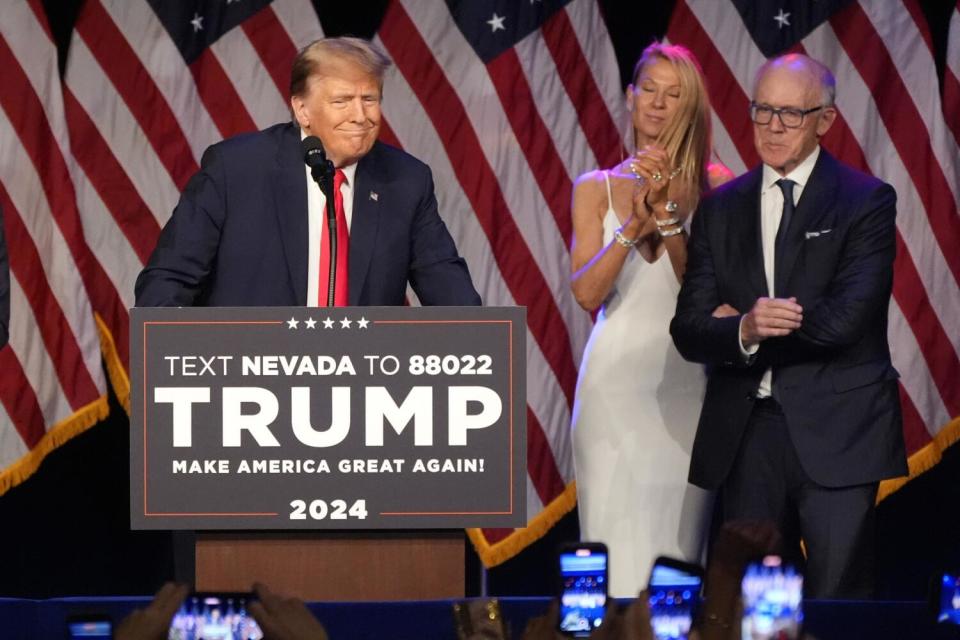
Trump, stopping in Las Vegas before Nevada’s GOP caucuses in early February, slammed Biden’s handling of the mounting number of people crossing the U.S.-Mexico border, and called human trafficking of migrants “a weapon of mass destruction” against the U.S.
Even as the candidates gear up for their marathon to election day with more than seven months to go, interviews with more than two dozen voters, elected officials and political consultants in Arizona and Nevada revealed a collective ennui about Biden vs. Trump 2.0.
“There’s a voter fatigue, I think,” said Arizona House Minority Whip Nancy Gutierrez, a Democrat. “People are just sick of being bombarded, with no bipartisanship and no working together on many of the same issues.”
Democrats say Biden must do more to highlight what they claim as his accomplishments, including job creation tied in part to an infrastructure law that brought public works to Nevada and Arizona, and passage of a bipartisan gun control measure that increases background checks for younger firearm buyers.
They also cite the president’s efforts to protect access to abortion and contraception via executive orders after the Supreme Court’s 2022 decision overturning Roe vs. Wade, and his support for a robust U.S. presence internationally, including through aid to Ukraine in its war with Russia.
Republicans plan to rely on what they contend was America’s stronger standing during Trump’s four-year tenure in Washington, citing high levels of employment and lower inflation as hallmarks of his administration.
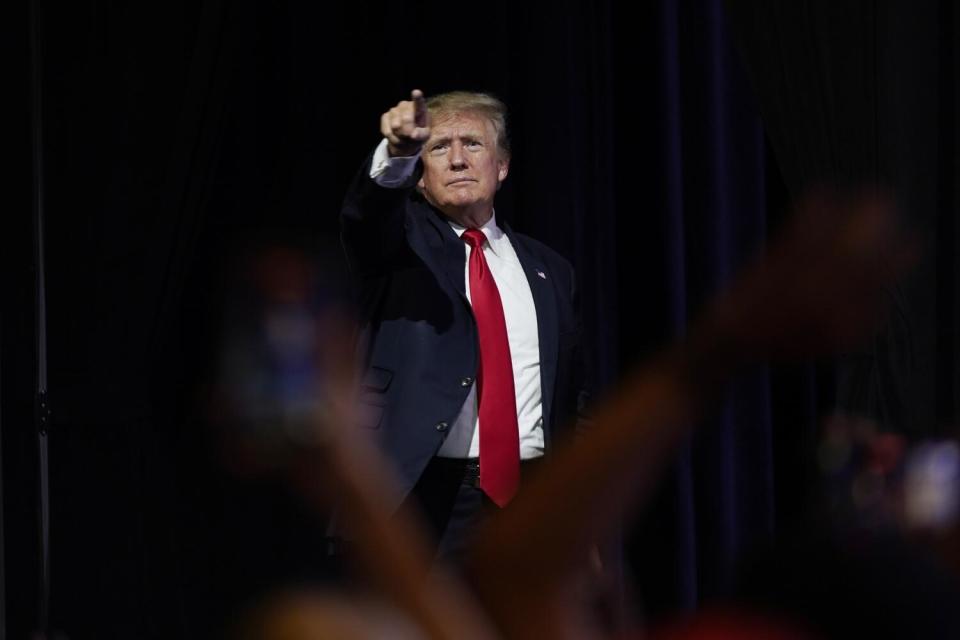
Trump also claims credit for building up the wall dividing the U.S. and Mexico to reduce illegal crossings, as well as for pushing through $3.2 trillion in tax cuts, appointing Supreme Court justices who rejected the nationwide right to abortion, pulling the U.S. out of trade agreements he said hurt American workers, and clearing the way for the U.S. to become the world’s top producer of oil and natural gas.
The state of the economy, a perennial centerpiece of presidential electioneering, is cited more than any other issue as the top concern in Nevada, which saw its unemployment rate spike to more than 30% during the height of the COVID-19 pandemic.
Unemployment in the state is just over 5% now, still the highest in the country. But even some with jobs express concern that high inflation has made it harder for them to pay their bills.
At a supermarket on the east side of Las Vegas last week, two men demonstrated the breadth of the disagreement about how the economy is doing.
Alberto Cardona said he didn’t care about all of the economists saying inflation had tapered off.
The electrician said they were “lying,” and he saw proof, literally, in the pudding. He said he paid 99 cents for a carton of pudding at the supermarket when Trump was president. Now it costs $1.47. He blamed Biden and other Democrats for the upswing, saying they supercharged inflation by overspending “and printing money that they don’t have.”
“Everything’s terrible right now. I’m living paycheck to paycheck, trying to support my family,” said Cardona, 50. He said he would vote for Trump.
A few minutes later, Fernando Alcazar pronounced himself ready to vote for Biden.
“Look at what he’s done and where the country is headed,” said the 52-year-old gambling industry consultant. “The economy is good, and we’re going in the right direction.”
Though inflation has climbed much higher in earlier eras, the low inflation of the last two decades or so has made the recent upswing feel disabling, especially to younger people, said Stephen Miller, research director at the Center for Business and Economic Research at the University of Nevada, Las Vegas.
But he said people’s views of the economy could be reshaped in the coming months.
“Between now and early fall, if grocery prices come down and gasoline prices come down, the mood will change,” Miller said. “We’ll see.”
Rep. Steven Horsford, a Democrat who represents Clark County in the U.S. House and chairs the Congressional Black Caucus, said that’s why it’s key for Biden to remain on point.
“You can’t only focus on the accomplishments, of which there are many,” Horsford said. “You’ve also got to talk about what you plan to do going forward.”
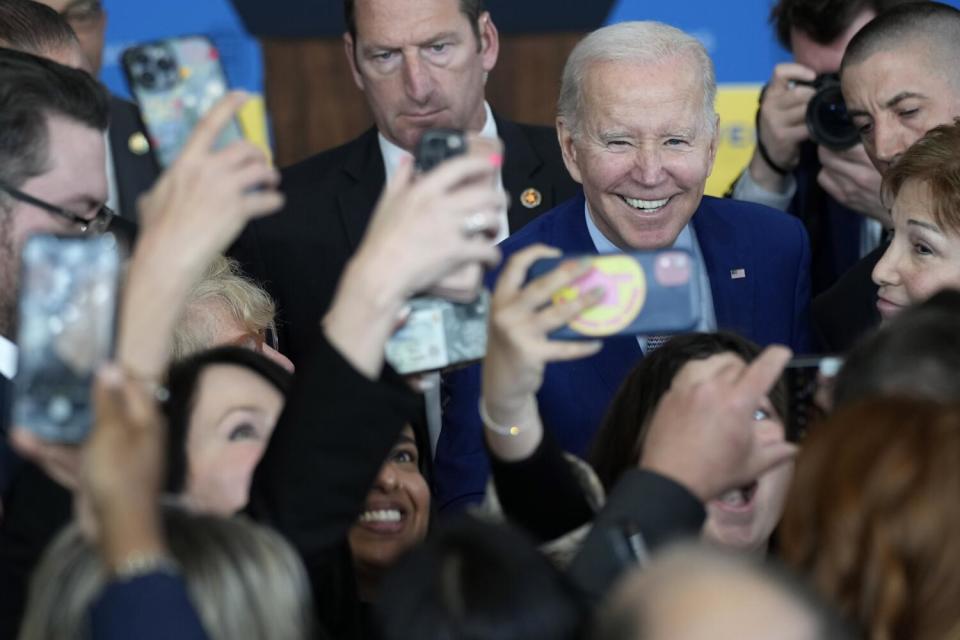
In both Nevada and Arizona, Democrats say access to abortion should be a winning issue for Biden. They described a wave of anger among their voters that followed the reversal of Roe.
Organizers hope to put measures supporting abortion access on the ballot in both states. Though a Nevada law protects access to abortion there, a political action committee is gathering signatures to qualify a measure that would enshrine abortion access into the state Constitution. The measure would apply for pregnancies of up to 24 weeks. Activists in Arizona are charting a similar course.
Republicans have a ballot measure of their own in Nevada: one that would require voters to present identification when they go to the polls.
The proposal responds to belief among conservatives that elections have seen widespread tainting by ineligible voters casting ballots. Though claims of such voter fraud have seldom been substantiated, they are accepted as a matter of faith, and are therefore highly motivating, to many in the GOP.
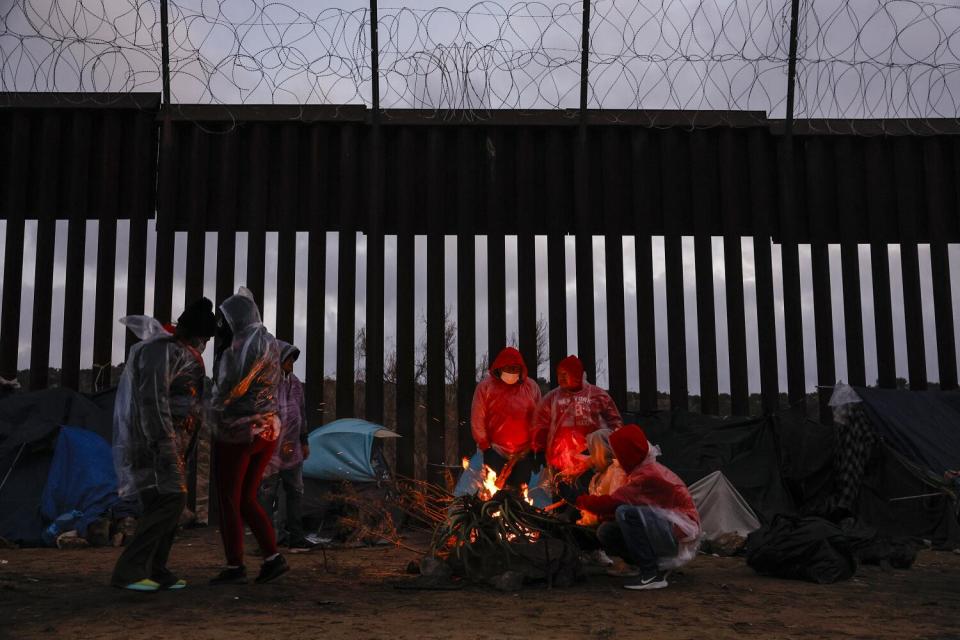
With migrant crossings from Mexico to the U.S. hitting a high in recent months, even Democrats in cities well north of the border have expressed concern about the burden newcomers put on infrastructure and public services.
Republicans plan to focus intensely on the issue.
Pinal County Sheriff Mark Lamb, who is running for U.S. Senate in Arizona’s Republican primary this summer, said Biden’s policies supporting migrants underscore an inherent unfairness in the minds of voters he’s met. Along with the economy, Lamb said, nothing angers his constituents more than the sense of disorder at ports of entry and in communities where migrants enter the country.
“They’re very angry with the misappropriation of tax funds used to put these people up in hotel rooms, to give them transportation on airplanes and to give them, in some cases, gift cards, while we have American veterans and we have Americans who are homeless and are struggling,” Lamb said.
Read more: How labor and a wily senator turned Nevada blue — and redrew the nation's presidential map
Democrats like Alcazar, the gambling industry consultant in Vegas, said it’s unfair and inaccurate to blame Biden for the surge of migrants. He noted that the White House had hammered out an immigration overhaul deal with congressional Republicans that included increased border security, only to have the GOP back away when Trump signaled his opposition.
“It was their chance to step up and do something about the issue,” Alcazar said. “But they didn’t follow through. Instead, they wanted Trump politics.”
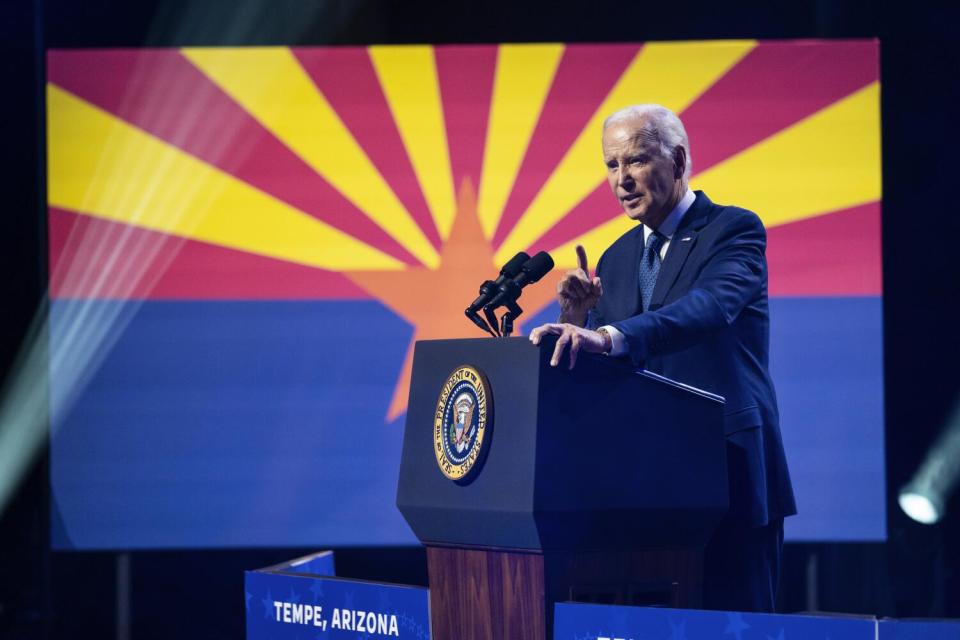
As the oldest president at 81, Biden has faced repeated questions about his mental acuity and fitness to serve.
Robert Bailey, a political independent, said he has voted for candidates of both parties in the past, but wouldn’t consider Biden this time.
Read more: Is Donald Trump a new King David? Ask California's right-wing Sons of Liberty
“He can’t remember things he needs to remember,” said Bailey, 57, a street performer in Las Vegas. “People just help him stay in office and get his job done.”
Some say Trump, 77, also shows signs of aging.
But more challenging critiques grow out of the dozens of criminal charges he faces — on allegations of illegality related to his attempts to reverse his 2020 election loss in Georgia and his stashing of classified government documents at his Mar-a-Lago resort and of obstruction of justice; of having a role in the attack on the Capitol on Jan. 6, 2021, in an attempt to prevent Congress’ certification of Biden’s victory; and of falsifying records related to hush money allegedly paid to porn star Stormy Daniels.
“We understand that Trump wants to take us backwards,” said Tucson Mayor Regina Romero, a Democrat. “You have Donald Trump running a campaign of creating doomsday scenarios and seeking retribution against his political opponents.”
Romero said Biden has a list of accomplishments that her constituents will feel the benefits of for decades. She cited the nearly $100 million that’s flowed to her city from the infrastructure and inflation-reduction measures he’s championed.
In Nevada, meanwhile, the Biden campaign will remind 12,000 residents about the student loan relief they got from the administration, and tell 22,000 seniors not to forget how Democrats capped the price of their insulin prescriptions.
Diane Farajian, 65, said that Trump was slow to respond to the coronavirus surge, and that he makes her uneasy. The retired Las Vegas blackjack dealer plans to vote for Biden, though she said she usually supports Republicans for the White House.
“We need good people in there,” Farajian said. “There was just so much trouble when Trump was in office.”
This story originally appeared in Los Angeles Times.


